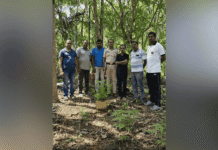The memories have faded over the decades, but they have not disappeared entirely. For those of us who grew up in Port Blair in the late 1980s and early 1990s, it was a different world—one where information was scarce, where society was conservative, and where certain crimes were spoken about in hushed tones, if at all.
Back then, news from the mainland arrived days late. Newspapers would come in bundled stacks, already outdated, but still devoured eagerly. The town was small, and options for leisure were limited. There were no malls, no cafes, and only a handful of hotels. For young couples seeking privacy, the choices were few—some found solace in the quiet corners of parks, others in the dense vegetation that covered the hills near Mazar Pahar, along the isolated stretch leading to Corbyn’s Cove.
But those seeking moments of intimacy often found themselves in danger.
In the local slang of the time, there was a term for what happened on those lonely stretches. It was called an “attack.”
The word did not carry the weight of its true meaning. It was used casually, almost playfully, among certain groups of young men who prowled those secluded spots, waiting for couples to let their guard down. It was a ritual—stalking, ambushing, and then separating the man from the woman. The man would be threatened, often chased away. The woman, left behind, had no choice. The attackers would force themselves on her, coercing her into acts she never consented to.
And then, they would boast about it.
“Kal raat ko attack kiya hum log, bahut maza aaya,” they would say to each other. “Last night, we attacked. It was fun.”
There was no fear of consequences, no guilt, no shame—only the thrill of power, the camaraderie of crime.
Yet, despite how frequently these attacks were whispered about, they never made it to the police station, never became newspaper headlines. There were no public protests, no demands for justice. In a town where even consensual relationships were frowned upon, where women were expected to be virtuous and submissive, the victims had no voice. Reporting an assault would have meant admitting to being alone with a man in the first place—an admission that carried its own punishments.
So, they stayed silent.
Today, Port Blair has changed. The roads are busier, the city more connected. The once-dense vegetation around Mazar Pahar has thinned, and what was once an isolated stretch now sees more traffic. The boys who carried out these attacks have grown older, some married, some fathers to daughters.





